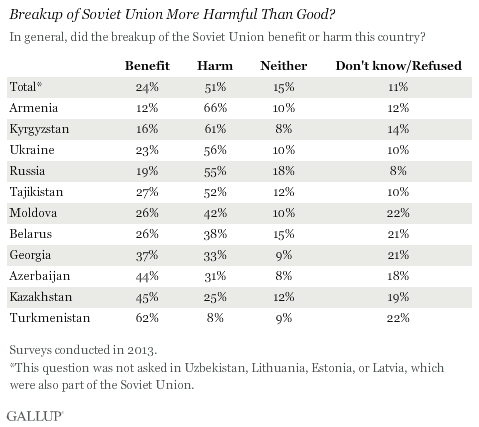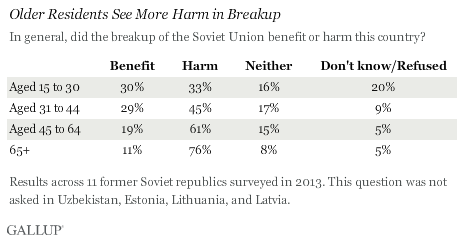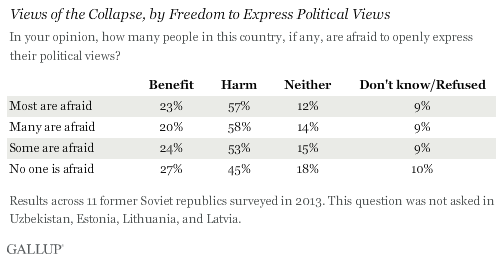WASHINGTON, D.C. -- Reflecting back on the breakup of the Soviet Union that happened 22 years ago next week, residents in seven out of 11 countries that were part of the union are more likely to believe its collapse harmed their countries than benefited them. Only Azerbaijanis, Kazakhstanis, and Turkmens are more likely to see benefit than harm from the breakup. Georgians are divided.

Overall, residents of these former Soviet republics are more than twice as likely to say the breakup hurt (51%) than benefited their countries (24%). For many, life has not been easy since the Soviet Union dissolved in December 1991. Residents there have lived through wars, revolutions, coups, territorial disputes, and multiple economic collapses. However, this is also the prevailing opinion in Russia, which continues to exert considerable economic and political influence over its former republics.
Younger People, Educated More Likely to See Benefit
Adults between the ages of 15 and 44 -- some of whom were not even born or were very young at the time of the breakup -- are nearly three times as likely as those 65 and older to say the collapse benefited their countries. The picture is similar in all countries except Georgia, where residents in all age groups are as likely to say it was a benefit. Older residents in all 11 countries whose safety nets, such as guaranteed pensions and free healthcare, largely disappeared when the union dissolved are more likely to say the breakup harmed their countries.

Overall, residents who are more educated are less likely to say the collapse harmed their country and more likely to say it benefited them. Kyrgyzstan is the exception. Kyrgyzstanis who are more educated are more likely to say the breakup harmed their country, which may reflect the mismatch between education and available jobs as the resource-scarce country shifted from the Soviet Union's centrally planned economy to a free market.
People Living in Fear More Likely to See Harm
Residents who say that "most people" in their country are afraid to openly express their political views are more likely to say that the collapse harmed their country than those who say that "no one" is afraid. This suggests the freedom they thought they might have after the fall of the Soviet Union has not materialized -- and in some cases, the situation may be even worse. Under the strict regime in Tajikistan, for example, 61% of those who say most people are afraid also say the breakup hurt their country, compared with 35% of those who say no one is afraid.

Residents Who See Better Chances for Children, Themselves, Also See Benefits
Overall, residents who see opportunities for their children and themselves to succeed are more likely to say the breakup benefited their country than those who do not. Thirty percent of residents of these former republics who say children in their country have the opportunity to learn and grow say their country benefited, compared with 18% who do not think children have this opportunity. And in all countries, residents who say people in their countries can get ahead through hard work are twice as likely to say their country benefited (29%) than those who do not think they can get ahead (17%).
Implications
Although many residents of former Soviet republics believe the breakup caused more harm than good for their country, future generations may reflect on it differently. There are signs that this is already happening among younger generations.
Whatever happened in the past, the future is in these former republic's hands. Governments in these countries would be wise to focus not only on their country's economic prosperity, but also on creating opportunities for residents, including children, to succeed in an atmosphere where they feel free to speak their minds.
For complete data sets or custom research from the more than 150 countries Gallup continually surveys, please contact us.
Survey Methods
Results are based on face-to-face interviews with at least 1,000 adults, aged 15 and older, conducted between June and August 2013 in Armenia, Azerbaijan, Belarus, Georgia, Kazakhstan, Kyrgyzstan, Moldova, Russia, Tajikistan, Turkmenistan, and Ukraine. Questions not asked in surveys in Uzbekistan, Lithuania, Estonia, and Latvia. For results based on the total sample of national adults, one can say with 95% confidence that the maximum margin of sampling error is ±2.7 to ±3.8 percentage points. The margin of error reflects the influence of data weighting. In addition to sampling error, question wording and practical difficulties in conducting surveys can introduce error or bias into the findings of public opinion polls.
For more complete methodology and specific survey dates, please review Gallup's Country Data Set details.
